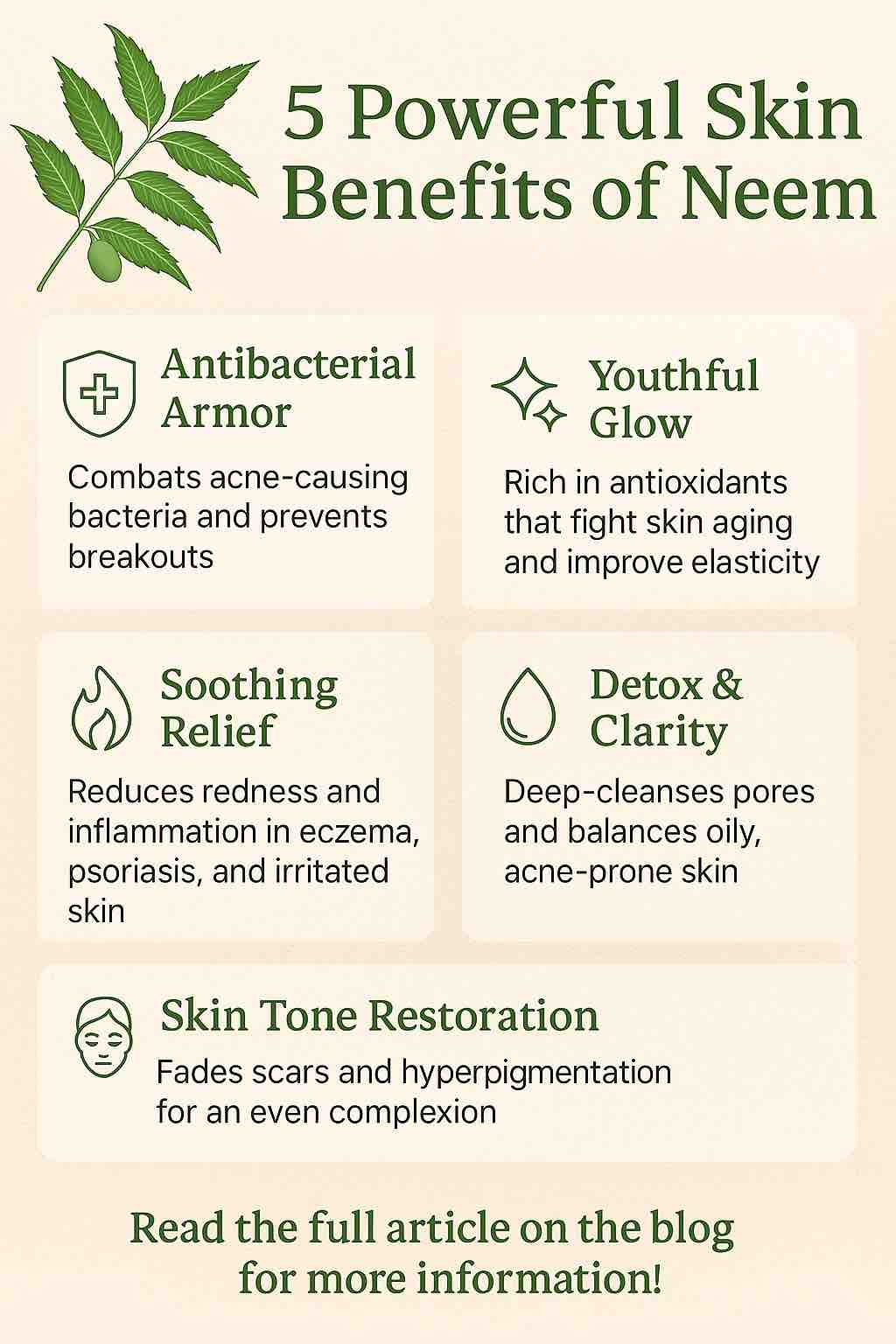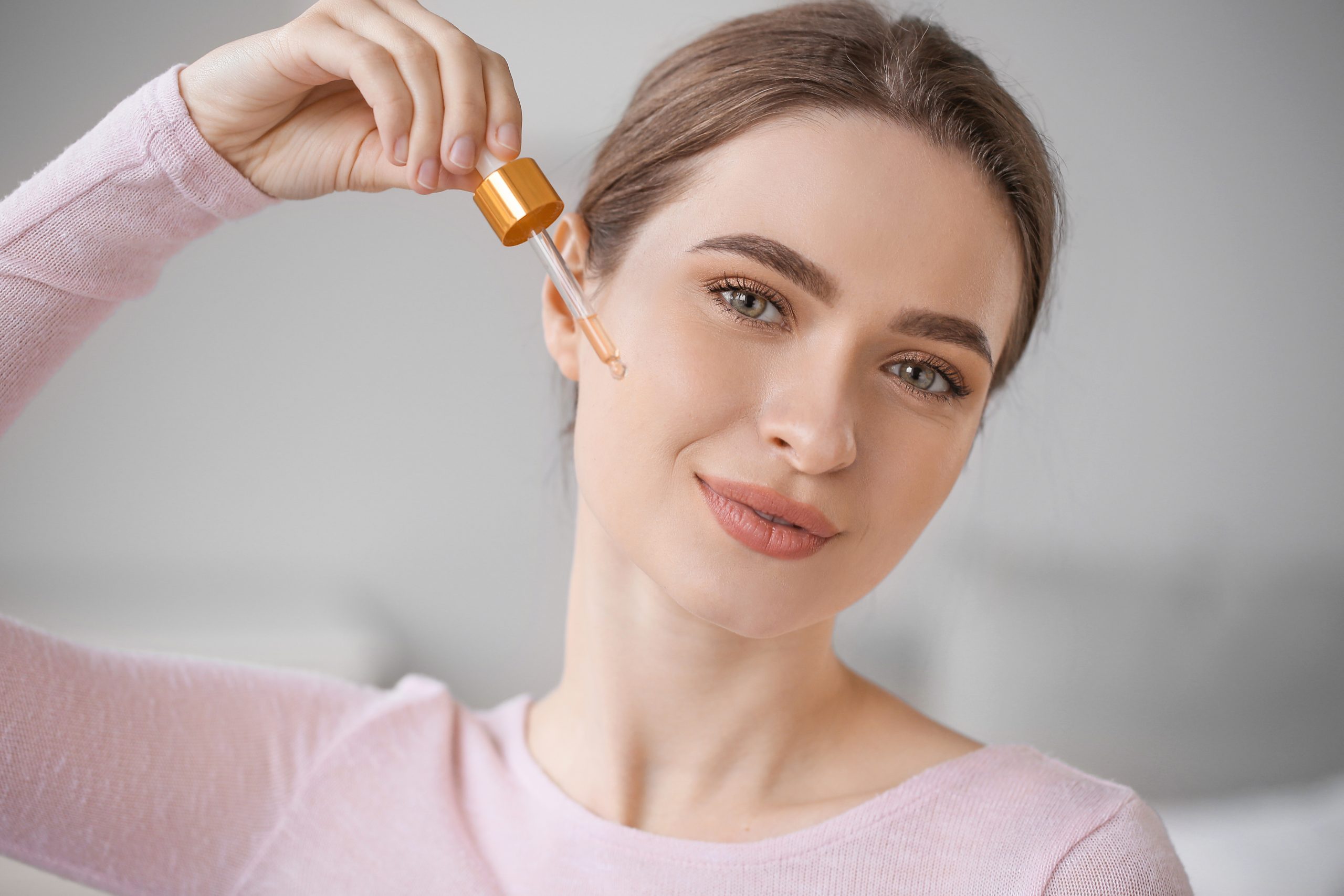
For centuries, the neem tree (Azadirachta indica) has stood as a silent guardian of health across the Indian subcontinent. Known in Ayurveda as “Sarva Roga Nivarini”—the healer of all ailments—every part of the neem tree, from its leaves and bark to its seeds and oil, is imbued with potent medicinal properties. Among its many health applications, neem is particularly revered for its profound benefits to the skin.
As modern dermatology increasingly acknowledges what ancient wisdom long understood, let’s delve deep into five powerful ways neem supports, protects, and revitalizes the skin, supported by both time-tested tradition and recent scientific findings.
1. 🛡️ Antibacterial Armor: Fights Acne at the Source
Breakouts occur when bacteria, oil, and dead skin cells clog pores. Neem is a natural antidote. Rich in compounds like azadirachtin, nimbidin, and quercetin, neem targets acne-causing bacteria while calming inflamed skin.
🔬 Scientific Backing:
- A 2023 study published in Dermatologic Therapy highlighted neem’s ability to inhibit the growth of Propionibacterium acnes—a primary contributor to acne.
- Unlike many synthetic treatments, neem is non-comedogenic and doesn’t strip skin of its natural oils.
🌱 Traditional Use:
Ayurvedic texts recommend neem leaf paste as a daily face mask for purifying the skin and preventing blemishes.
In short: Neem doesn’t just treat acne—it prevents it, naturally and gently.
2. 🔥 Soothing Relief: Anti-Inflammatory and Healing
Inflammatory skin disorders like eczema, psoriasis, and rosacea can cause persistent redness, itching, and discomfort. Neem offers multi-pronged relief.
Why it works:
- Neem contains Nimbidin, an active compound with proven anti-inflammatory activity.
- It reduces the production of histamines and prostaglandins—both of which cause redness and swelling in inflamed skin.
🌿 Clinical Insight:
A double-blind study (2022, Journal of Ethnopharmacology) found that topical neem extract significantly reduced itching and inflammation in patients with mild to moderate eczema.
Healing Bonus:
Its natural analgesic properties can relieve the stinging and burning sensations associated with chronic skin conditions.
3. ⏳ Youthful Glow: Antioxidants That Defy Aging
The skin’s aging process is accelerated by oxidative stress—damage caused by free radicals from UV radiation, pollution, and even stress. Neem is loaded with polyphenols, vitamin E, and carotenoids, which neutralize these harmful free radicals.
✨ What does that mean for your skin?
- Reduced appearance of fine lines and wrinkles
- Improved skin elasticity and firmness
- Protection against photoaging (sun-induced aging)
A 2023 in-vitro study in Photochemistry and Photobiology confirmed that neem oil can boost collagen synthesis and reduce wrinkle depth with consistent application over four weeks.
In essence, neem serves as a natural shield against premature aging while supporting skin renewal.
4. 💧 Detox & Clarity: Natural Pore Cleanser and Oil Balancer
Neem acts like a magnet for impurities. Its astringent and purifying qualities help cleanse pores, remove excess sebum, and balance oily skin types.
Key Effects:
- Tightens pores and reduces blackheads
- Prevents buildup of dead skin cells and oil
- Gently exfoliates without harsh abrasives
In fact, recent dermatological reviews suggest neem may assist in regulating sebum production at a cellular level—making it ideal for oily and combination skin types.
The result? Clearer, fresher skin that breathes.
5. 🌟 Skin Tone Restoration: Fades Scars and Pigmentation
One of neem’s most underappreciated talents is its role in scar healing and pigmentation correction. Whether it’s acne scars, sunspots, or uneven skin tone, neem’s regenerative properties can gradually restore clarity.
Here’s how:
- Vitamin E and fatty acids in neem oil support cell regeneration and skin barrier repair.
- Anti-inflammatory agents reduce the darkening of scars caused by post-inflammatory hyperpigmentation (PIH).
- Antifungal properties help treat pigmentation caused by fungal infections like tinea versicolor.
In traditional beauty rituals, neem paste was often applied to areas of discoloration as part of multi-week skin rejuvenation routines.
🌐 The Modern Take: Ancient Wisdom Meets Modern Science
Today, dermatologists and researchers alike are taking neem seriously. It’s being studied not only for acne and aging but also for its potential in treating dermatitis, skin infections, and even UV damage. Its gentle yet effective action makes it a preferred choice for natural skincare enthusiasts seeking clean, plant-based alternatives to chemical-heavy products.
🧘🏽♀️ Final Thoughts: Skincare That’s Rooted in Nature
In an era where synthetic ingredients often do more harm than good, neem stands out as a holistic, bioactive skincare hero. Whether you’re looking to combat acne, slow aging, soothe irritation, or even out your skin tone, neem offers a versatile, well-rounded solution—backed by both ancestral practice and cutting-edge science.
Nature didn’t design neem to be a trend. It designed it to heal.
🔍 Frequently Asked Questions (FAQs)
1. Can neem be used on all skin types?
Yes, neem is suitable for all skin types, but especially beneficial for oily, acne-prone, or inflamed skin. However, those with very dry or sensitive skin should do a patch test first, as neem can be potent.
2. How often should neem be used in a skincare routine?
For masks or pastes, 2–3 times per week is sufficient. Neem oil (when diluted) can be used daily or every other day as a spot treatment. Overuse may cause dryness in some skin types.
3. Is neem safe to use during pregnancy or on children’s skin?
Topical neem (in diluted form) is generally safe for external use. However, pregnant or nursing women and parents of young children should consult a healthcare provider before consistent use.
4. Can neem help with fungal infections on the skin?
Yes. Neem has proven antifungal properties and is effective against conditions like athlete’s foot, ringworm, and candida-related rashes.
5. How long does it take to see results with neem?
For acne or inflammation, visible improvements may occur within 1–2 weeks of regular use. For scar reduction or pigmentation, it may take 4–6 weeks of consistent application.
6. Can neem oil be applied directly to the face?
Neem oil is very concentrated and should always be diluted with a carrier oil (like jojoba or coconut) before applying to the face. Direct application may irritate sensitive skin.
7. What’s the best form of neem for skincare: oil, powder, or fresh leaves?
All forms are beneficial:
- Neem oil: Best for targeted treatments and moisturization.
- Powder: Great for masks and scrubs.
- Fresh leaves: Ideal for traditional pastes and tonics, but less accessible.
8. Does neem help with skin aging and wrinkles?
Yes. Neem contains antioxidants that fight oxidative stress, helping to reduce fine lines, improve elasticity, and prevent premature aging.
9. Can I use neem with other skincare ingredients like salicylic acid or retinol?
It’s best to avoid combining neem with strong actives like retinol or acids unless spaced apart (e.g., neem in the morning, retinol at night). Always patch test first to prevent irritation.
10. Is there a risk of allergic reaction to neem?
Although rare, allergic reactions can occur. Symptoms may include redness, itching, or mild burning. Always perform a patch test before using any neem product more broadly.










